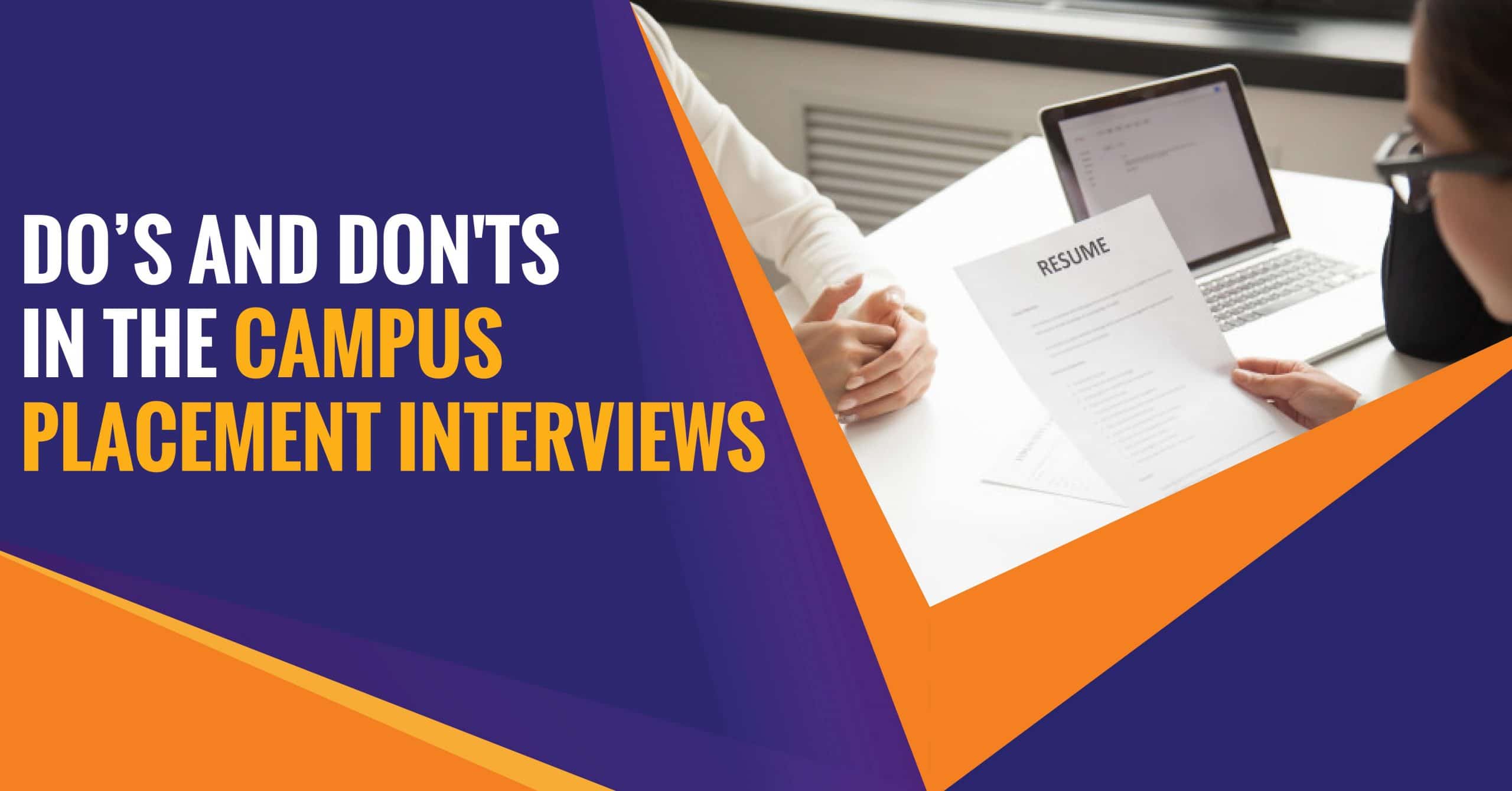Table of Contents
ToggleOverview of Campus Placement Interviews
Interviews are very important since they offer a chance to have a decent and long-lasting first impression on a person. Huge importance is given to a person’s lead during the main cooperation with the business.
Particularly on the off chance that one is a fresher appearing for campus placements job interview, this cooperation can bring a ton of things into the radar besides academic performance and the CV. Release us through this rundown of dos and don’ts of grounds situation interviews for a superior comprehension of the cycle.
Campus placements provide high packages to the students. It’s quite an easy process, students easily appear for interviews on their college campus.
The Do’s and Don’ts in Campus Placement Interviews
Interview Do’s
While certain things may work for an individual and probably won’t work for the other, given beneath are a few recommendations that are a great idea to follow. Think about them as the charges to follow perfectly.
* Ask questions and be frank in your methodology.
Don't Know Which Career Option Is Best For YOU?
Get in Contact With our Expert Counsellors and Clear all Your Doubts.

* Know about the company’s profile and how well you can fulfill their requirements.
* Be Confident.
* Be agreeable while talking with your hand gestures.
* Be reliable and guarantee that you reach at any rate 10 minutes before the schedule.
* Bring a copy of every important archive.
* Dress appropriately and look neat and clean.
* Express yourself in simple words and clearly
* If you are being interviewed by a panel, ensure to make eye contact with the person who is asking questions.
* Be alert and listen to the questions and answer thoughtfully.
* Present your strengths in a positive way, even your shortcomings.
* Try to completely understand the questions and raise the questions if you have any doubt regarding this.
* In an interview, try to maintain a positive picture that your CV has just created the first round of short-listing.
* Show excitement for joining the company and the position.
* Use a strong voice, clear diction, and correct grammar.
* Ensure your own appearance is proper and formal and you dress appropriately.
* Make eye contact with the interviewer but don’t stare at him.
* Do furnish yourself with sufficient knowledge about the company you are seeking a job in.
* Do take analysis gracefully.
* Do furnish yourself with a strong knowledge of your company (in case of prior work experience)
* Do display a sense of mind as and when possible.
* Do display a combination of self-confidence, grace, and balance.
* Do take sufficient time to think before answering tricky questions and do not be rushed into your answers.
* Do make concrete goals in planning your career.
* Do show adequate command of the key graduation concepts.
* Do have sufficient knowledge of your key projects and papers.
* Support your answers with examples, whenever possible.
* Do introduce yourself as a multi-tasking personality with the capacity to learn from both academic and extracurricular activities.
Interview Dont’s
* Don’t be arrogant, over-aggressive, or vain.
* Don’t give that information if you are not sure of it. You are the only one who provides the content to the interview, you should know about what you are sharing.
* Don’t contradict your own answers.
* Don’t be late, it creates a bad image. Available before time.
* Don’t display prejudice or bias.
* Don’t be uncertain or indecisive in your thoughts.
* Don’t comment on your past performance. Always be positive.
* Don’t ignore the interviewer. Show your interest in the company and interviewer.
You can Read Also: 10 Skills Employers Are Looking for in 2020
Other Dont’s
1. Do Not Lie or Misinterpret
Given the speed and simplicity of getting to online information today, with admittance to a wide range of data from driving records and duty installments to school participation, creating a bogus case on numerous things can be handily found.
In this way, to try not to make a terrible recruit, numerous businesses twofold check data given by the work up-and-comer utilizing Google and LinkedIn just as your references. Bogus cases are destructive, so don’t hazard it.
2. Try Not to Trash Your Boss or Any Coworker
Addressing questions genuinely is a necessity, yet don’t be negative about a current or previous manager or colleague. This is perhaps the greatest error work up-and-comers make. Saying anything negative is destructive.
Zero in on the best parts of the work and individuals, regardless of whether you despised working there, with those individuals. At the point when you are negative, the presumption commonly made is that there are the famous “different sides to each story,” and the opposite side of this story may have something exceptionally negative to say about you.
3. Try Not to Talk or Text on Your Cell Phone During The interview
Spotlight totally hands-on meeting. Mood killer your cell phone, and don’t get to it during the meeting. Truth be told, keep it killed until you leave the business’ or scout’s office.
Try not to pose questions about personal investigations and medication tests, or raises, occasions, and get-aways – until the bid for employment arrangement.
Getting some information about the circumstance and force of medication tests and historical verifications to make you seem as though you have something to cover up, raising enormous warnings for the questioner and, probably, finishing a chance.
4. Remember to Send a Thankyou Note After The Interview
A decent elegantly composed card to say thanks is regularly fundamental, in any event, when sent by means of email, yet less than 25 percent of interviewees send them. Keep in mind, the meeting, and how you handle the entire cycle, is an example of your work.
Exhibit your comprehension of the cycle, the standards of basic politeness, your obligation to finish a “project,” and your capacity to convey recorded as a hard copy by sending a card to say thanks (or email) following the meeting.
You can Read Also: Key Benefits of Studying at the Top University in India
Frequently asked questions in Campus Placement Interviews
1. Tell me something about yourself
We suggest a basic and powerful equation for organizing your reaction present, past, future.
Present: Talk a little bit about what your present job is, its extent, and maybe a major ongoing achievement.
Past: Tell the interviewer how you arrived and additionally notice past experience that is pertinent to the work and friends you’re applying for.
Future: Segue into what you’re looking to do straight away and why you’re keen on this gig (and an incredible fit for it, as well).
Do’s and Dont’s
Tailor Your Answer to the Role and Company
“At the point when an interviewer asks that, they truly mean educate me regarding yourself as it’s pertinent to the position you’re applying for and this organization. I believe they’re allowing you a chance to express compactly why you have the correct capabilities.
Keep It, Professional
Introduce yourself accordingly what so ever your interviewer wants from you. Fulfill their expectations.
It should be in a precise manner.
Practice (But Don’t Memorize)
You would prefer not to stand by until you get this question in a live meeting to evaluate your response unexpectedly. Thoroughly consider what you need to pass on about yourself in front of each meeting and work on saying it so anyone can hear.
Know Your Audience
Likewise with any interview question—or discussion besides—you’ll need to ensure you comprehend who you’re conversing with. You may get some type of “enlighten me concerning yourself” at each and every phase of the meeting interaction for a task, from the telephone screen through conclusive rounds, yet that doesn’t mean you need to offer a similar careful response without fail.
Keep It Positive
On the off chance that you were terminated or laid off from your last work, this most likely isn’t the best second to make reference to it. “There are a period and spot for everything—you don’t need to pack everything into this answer,” Campos says. “On the off chance that you see this as your initial introduction expertly, give them a window into that yet don’t give them everything. The discussion’s not prepared for that.
Recollect This Is Often Your First Impression, and It Matters
We truly just have one opportunity to establish a first impression and you as the interviewer will shortlist you from this aspect. Be positive and soft-spoken. This will create a good or bad image. It’s up to you that what you create.
2. What are your likes and dislikes?
- Attempt to connect what you ‘like’ to any of the prerequisites of the work you are applying for. Likewise, remember that you are hoping to leave your current positions so don’t make a major rundown.
- It gives you consistent new difficulties to test your capacities.
- Communicating and meeting with new individuals.
- Working as a part of a team
Interview Dont’s
- Don’t utter negative for your previous company, directors, or managers. Rather focus on other general issues.
- Here and there it is hard for you to get a feeling of accomplishment in a major organization like your current business.
- There are not many freedoms for headway with my current boss who are a little organization.
- Over issues
- Salary expectation
3. What are your strengths and weaknesses?
Strengths
You ought to have just referenced your strengths and weaknesses in your CV or introductory letter. To address any question like this basically go over what you have written in your resume. Anyway, consistently be set up to back up any answers you give with an example. Do whatever it takes not to show up large-headed or somebody with an expanded sense of self. Add a touch of humility to any answers you give.
Interview Do’s
I have been informed that I am straightforward, solid, and moral.
You need to keep moving, on the off chance that you realize that an assignment is significant, at that point you will strive to complete it on schedule.
You are a quick student.
Capacity to speak with individuals.
Adequately adaptable to deal with evolving conditions.
Ready to adapt to misfortune and gain from my errors.
Weakness
Notice that you have a flaw, however then additionally add a recommendation of improving that defect or exhibit any moves you are making to address any weakness. Talking in a positive manner if you are saying your weaknesses.
Interview Do’s
- My MS PowerPoint abilities are weak, so I have selected an evening course to improve them.
- I’m sometimes accused of being over Friendly.
Interview Dont’s
- You are Workaholic
4. What is your Ambition?
You should always see that, your aims and ambitions should focus and match the company’s goals. This helps you achieve your goals and also will be beneficial for the company too.
So, it is very vital to first know the company goals of the company. For this before coming for an interview, you should do smart research about the company.
Interview Do’s
Your long-term goals involve growing with a company where you can continue to learn, take on additional responsibilities, and contribute as much value as possible to the team. Your company emphasizes professional development opportunities. You would take full advantage of the educational resources available.

“The IIS University Team is a group of expert teachers and staff who are passionate about helping students learn and grow. They come from different fields but all aim to help guide the university’s students. They write these blogs to share their thoughts and ideas about learning and the importance of education. Their goal is to help students prepare for the future in a simple and understandable way.”
